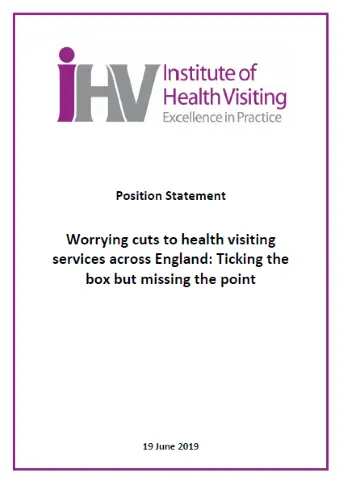The Institute of Health Visiting (iHV) fully supports the new recommendations on supporting breastfeeding mothers published today by the Royal College of Paediatrics and Child Health (RCPCH), during World Breastfeeding Week (#WBW17). The new RCPCH recommendations show that social stigma is a major barrier to breastfeeding and more must be done to support women to continue to breastfeed beyond the first few weeks.
The new guidance, based on the latest research, aims to give practical advice on how long women should consider breastfeeding and makes the case for the health benefits of breastfeeding for both mother and child, as well as the cost savings to families and health services.
Dr Cheryll Adams CBE, executive director of the Institute of Health Visiting, said:
“We warmly welcome this new guidance from RCPCH on supporting women to continue breastfeeding beyond the first few weeks. Breastfeeding is natural, but not all mums find it easy, and some mums cannot or choose not to do it, so we must respect that too. Mums often need support, and health visitors are one of the key healthcare professionals to help mothers establish breastfeeding through the universal health visiting service, but there is a need to educate the wider public and change the attitude and culture of society around it.”
The RCPCH recommendations include:
- Governments in each nation to ensure familiarity with breastfeeding is included as part of statutory personal, social and health education in schools;
- UK Government to legislate for employers to support breastfeeding through parental leave, feeding breaks and facilities suitable for breastfeeding or expressing breast milk;
- Local breastfeeding support to be planned and delivered to mothers in the form of evaluated, structured programmes;
- The NHS to ensure the preservation of universal midwifery services;
- UK Governments to commit to adequate resourcing to preserve universal health visiting services;
- Public Health England to develop a national strategy to change negative societal attitudes to breastfeeding;
- Welsh, Scottish and Northern Ireland Governments to review and evaluate their existing breastfeeding promotion plans;
- The NHS in England and the Welsh Government to follow the lead of the Scottish Government and the NHS in Northern Ireland by requiring all maternity services to achieve and maintain UNICEF Baby Friendly Initiative accreditation; this requirement is currently met by all maternity units in Scotland and Northern Ireland;
- UK Government to reinstate the UK-wide Infant Feeding Survey, which was cancelled in 2015, to ensure reliable, comparable data on breastfeeding is recorded across the four nations;
- All healthcare professionals should be aware of local and national support for breastfeeding mothers.
Dr Adams added:
“We at the iHV will be working with the RCPCH to support their campaign to improve breastfeeding in the UK to help women to continue breastfeeding beyond the first few weeks and help change societal attitudes by educating the wider public.”



